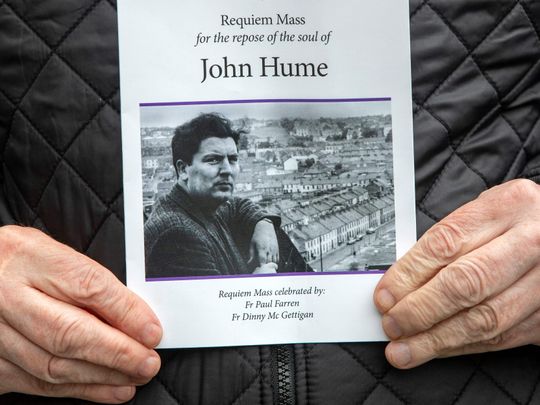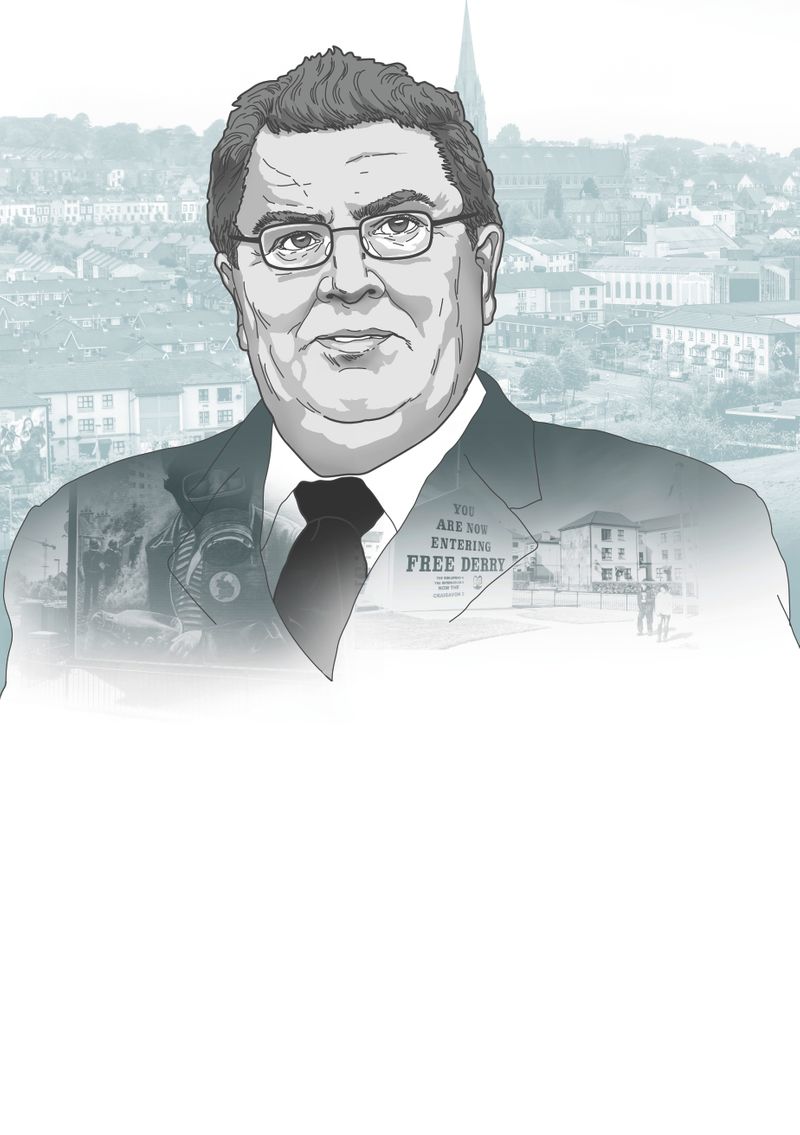
Single-handedly John Hume almost kept the Irish chocolate industry in profit, devouring Crunchies and Twix bars like nobody’s business. He might have been awarded a Nobel Peace Prize, but he still believed the bubbles of air in Aero bars made them less harmful to his waistline.
A bit of blarney perhaps, but he was a man of words and a man true to his word, a man who single-handedly too did more to end decades of sectarian and political violence in Northern Ireland — the longest-standing terrorist campaign in Europe that claimed 3,600 lives and injured 36,000 more — than others of his era.
Hume died on Monday, aged 83, after a long battle with dementia. How sad that such a cruel disease would rob him of the memories of a remarkable life preaching non-violence, tolerance and understanding in a corner of Ireland numbed by brutality, social injustice, economic deprivation.
He was laid to rest on Wednesday in his native city of Derry. Coronavirus restrictions too meant that he was not afforded the crowded send-off his remarkable life deserved — but his place in the hearts of many and in the pages of history remain etched indelibly.
On one of many notable occasions, Hume, with wisps of his curly black hair blowing in a stiff and rainy wind, confronted British paratroopers in full combat gear, telling the commanding officer in full glare of television cameras: “You might govern us, but you are not here with our consent.” He was hosed with purple dye and promptly arrested
And for those who are alive today because of the peace deal he worked tirelessly to secure — the Good Friday Agreement and the peace process that has followed over the past 25 years.
A towering figure
He was a towering figure who helped define Irish nationalism of the mainstream — not the violent and blood-stained republicanism of the Provisional Irish Republican Army and its political wing of Sinn Fein that waged a three decade campaign of violence against Northern Ireland unionism, loyalists who believed the past and future of the British-governed province lay in the United Kingdom.
Hume was a man of humble beginnings, his father a riveter on Derry’s docks, his mother a seamstress in a city shirt factory. They lived in a simple two-bedroomed terraced home with an outside toilet, where Hume was quick to learn that education would be the only ticket out of bone-chilling and back-breaking poverty that pervaded the divided city.

He won a scholarship from the local St. Columb’s Secondary School to the Roman Catholic seminary and university of Maynooth, to the west of Dublin. Any inclination of continuing onto the priesthood and its vow of celibacy went out the window when he may his future wife, Pat.
They both graduated and returned to Derry to begin teaching careers. But the city was gripped by sectarianism which ensured that protestant homeowners had the right to vote in local elections and secured public housing on the east side of the River Foyle, its Roman Catholics deprived of economic and social opportunity, voting rights and poor housing.
Pawn shops or loan sharks were the only means of finance open to many, with Hume first rising to prominence in the city for organising its first credit union.
Rise of a political star
It also whetted his appetite for elected politics, taking a leading role in the nascent civil rights movement in the province, a movement that drew inspiration from events in the southern United States.
The three decades of ‘the Troubles’ sprang from the Northern Ireland governments to suppress opposition to its state-sanctioned sectarianism where some 60 per cent were protestant and enfranchised, the remained catholic and suppressed socially and administratively.
As violence spilled over, Hume took a leading role in confronting both police, army and security forces on one side, and republican elements on the other who were eager to escalate into full military and violent confrontation.
On one of many notable occasions, Hume, with wisps of his curly black hair blowing in a stiff and rainy wind, confronted British paratroopers in full combat gear, telling the commanding officer in full glare of television cameras: “You might govern us, but you are not here with our consent.” He was hosed with purple dye and promptly arrested.
Indeed, in January 1972, when the same regiment opened fire on unarmed civilian protesters, murdering 14, Hume gave part of his meagre salary to pay for victims’ funerals.
He was equally scathing of IRA violence, believing in the socialist values of his Social Democratic and Labour Party would only make things better for all. “You can’t eat a flag,” he often noted.
A votary of peace
He was the first to articulate a vision that only the two communities in Northern Ireland could find a way forward, and that the province should also refine the relationship between the republic of Ireland and the UK.
Hume was stubborn, often an outcast, often shunned, for his belief in building trust and bridges based on a shared future, decided by the ballot box and not the bullet. His car was burned out, his home firebombed.
After direct rule was implemented from London, Hume turned his attention to running as a Member of the European Parliament in 1985.
If a Europe that was divided and ruined by the Second World War, could build a united future based on prosperity and social programmes, it had a role to play in bringing peace to the province.
Twice, in the Sunningdale Agreement of 1973 and the Anglo-Irish Agreement of 1985, Hume managed to bring both sides to the brink of a workable deal to govern the bloodied and heaving province. Twice, those plans were undermined by a veto of the loyalist majority endorsed by successive governments in London.
Hume was the first to realise that if a permanent peace was to come to the province, Washington would have to be involved, and the White House and US Congress would both need to convince London that the veto had to go.
At his funeral service on Wednesday, messages from former President Bill Clinton, the Dalai Lama and Pope Francis all recognised his role in stopping the killing. Above all, he was a peacemaker.








